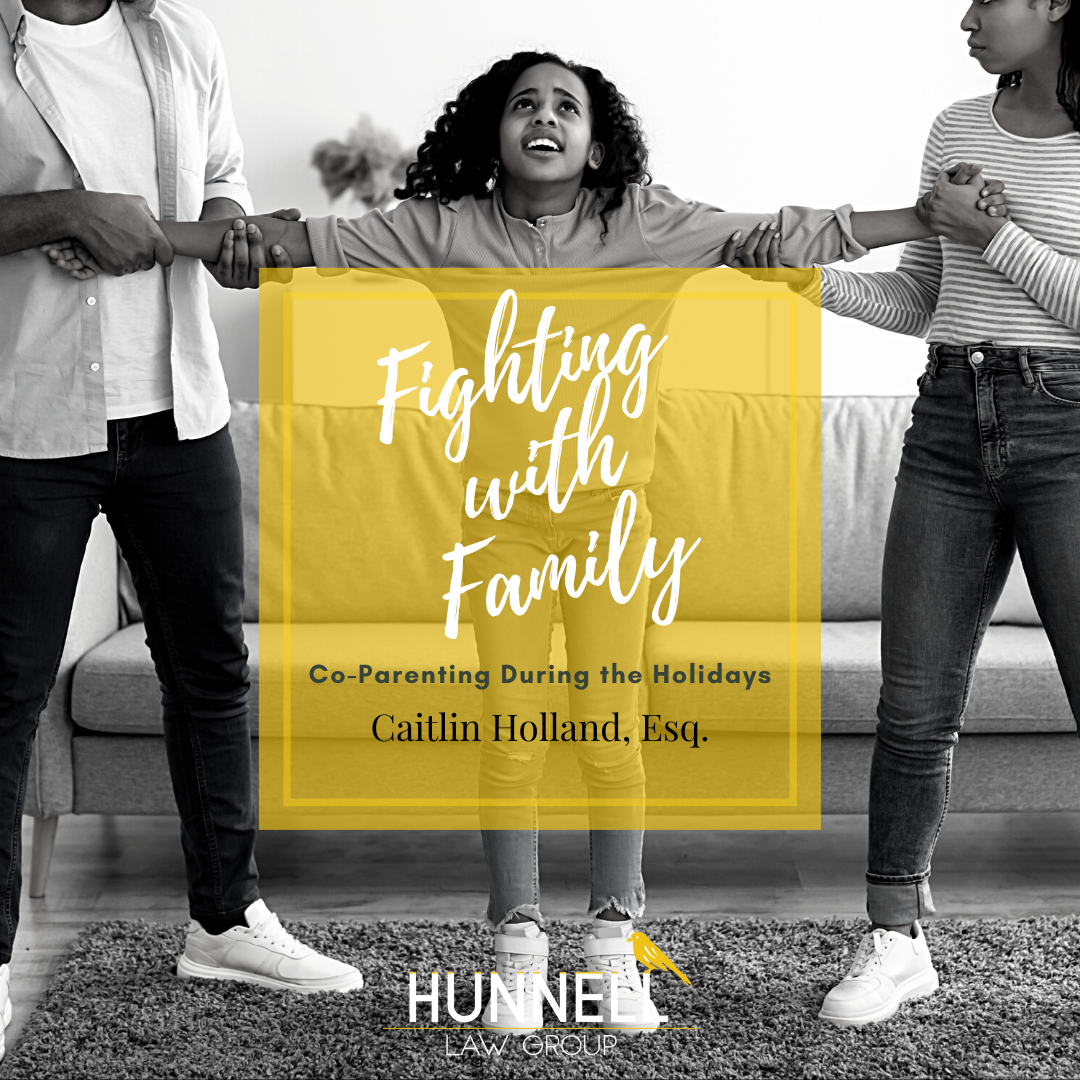 Fighting with Family: Co-Parenting During the Holidays For many, the Holiday Season is full of cheer excitement and love. For others, it’s a time of stress and emotion. For parents who are co-parenting for the first time after a divorce, the Holiday Season can bring about difficult challenges and emotions that are brand new and hard to navigate. Co-Parenting is tough, regardless of the time of year. However, this time of year is especially challenging. Parents are obliged to miss time with their children during the holidays, abandoning family traditions and forced to implement new ones. Arranging time with extended family, going to pageants, concerts, and year-end parties all while navigating this new family arrangement can be overwhelming. Time Sharing The best way to navigate co-parenting during holidays is simply to make sure that you have a plan. If you have advance notice, it’s easier to make arrangements with family and friends, etc. to see your children for the holiday or introduce new family traditions. Your parenting time agreement should implement some form of time sharing for holidays and special days. Some parenting plans even reference Court Holiday Schedules as the default parenting arrangement. The key is to make sure that you have an arrangement in effect for parenting time over the holidays well in advance so that if there are any issues or changes that have to be made, both parents can address them and make their own plans with the children. If your child’s other parent refuses to allow you to see your child over the holidays, you do have options. If you have an agreement that allots specific holiday parenting time and the other parent is not abiding by that agreement, you should consider mediation or counselling. If that is not an option, you may make an application to the Court to enforce that agreement. However, it is important to note that both at Thanksgiving and the week between Christmas and New Year’s Day, the Judges are not all present and, therefore, the Court only hears emergent matters. Emergent applications are made when the issue cannot adequately be addressed within a typical twenty-four day motion period and must be heard immediately. You should contact an attorney to determine whether your case could be considered emergent and heard by the Court during that time. Most holiday parenting time enforcement applications are not emergent. In that case, you will have to file an application with the Court that will not be heard until at least twenty-four days after you file your application. If you do not have a parenting time arrangement that addresses parenting time, you can try to make arrangements on your own in writing, or agree to attend a mediation to establish a holiday parenting time agreement. Again, make sure you give yourself enough time in advance of the holidays, so any issues that have to go before the Court can be resolved in advance of the holidays. If you cannot come to an agreement with your co-parent, then you will have to file an application to establish a parenting time arrangement. Again, this will not typically be considered an emergent action, although you should consult with an attorney if you think it could be. In most cases, it will take that same twenty-four days, at least, for your application to be heard by the Court. Acknowledging the Best Interests of the Child Do not put your child in the middle of any conflict. The best interests of the child is the guiding principle for all family law matters in New Jersey. In all aspects of co-parenting, including time sharing, it is important to remember that you should be serving your child’s best interests, not your own. After you finalize your holiday parenting time arrangement with the other parent, make sure to spend some time talking to your child about what to expect during the holidays and acknowledging and managing their emotions. Try to be flexible with your own expectations. Of course, all parents want to be with their children on Christmas morning, but if that means that you force your spouse to drive through a blizzard to effectuate your parenting time, that’s probably not in the child’s best interest. Likewise, if great-grandma is going to be a Christmas dinner at the other party’s house and great-grandma has been very ill and your child would like to see them, it may be beneficial to your child to see their grandparent. When you do have your child with you for holiday parenting time, make sure you’re cognizant of the conversations happening around your child. Do not let your family and friends disparage the other parent in the presence of your child. If you anticipate your family saying things that could make your child uncomfortable, it may be worth it to have a conversation with your family and friends ahead of time. There’s always next year It is important to remember that this Holiday Season is not be-all and end-all. If something did not work this year, make sure that you address it before next year. If there was a problem that needs to be addressed in mediation or by the Court, make sure to address it sooner than later, so that everything is in effect for next year. If you have any questions or concerns about how to navigate the holidays as a co-parent, visit HunnellLaw.com/contact to request an appointment with an attorney.
0 Comments
Leave a Reply. |
Details
Contributors:Stephanie Hunnell, Esq. , Ryan Westerman, Esq. and Caitlin Holland, Esq. Archives
April 2024
Categories
All
|
|
Hunnell Law Group, LLC is conveniently located at 908 Main Street., Asbury Park, NJ 07712
You can contact us at 732-749-3500 or by facsimile at 732-749-3503 Attorneys serving Asbury Park, Avon-by-the-Sea, Belmar, Manasquan, Bradley Beach, Freehold, Toms River, Fair Haven, Red Bank, Manalapan, Marlboro, New Brunswick, Jackson Township, Brick, Howell, Asbury Park, Ocean Township, Eatontown, Wall Township, Neptune City, Neptune Township, Spring Lake, Wanamassa, Lake Como,
Monmouth County, Ocean County, Middlesex County, and Mercer County, in Central New Jersey. |
© 2019, 2020, 2021, 2022, 2023 Hunnell Law Group, LLC, all rights reserved. Disclaimer & Site Map & Privacy Policy.
No aspect of this advertisement has been approved by the Supreme Court of New Jersey.

 RSS Feed
RSS Feed